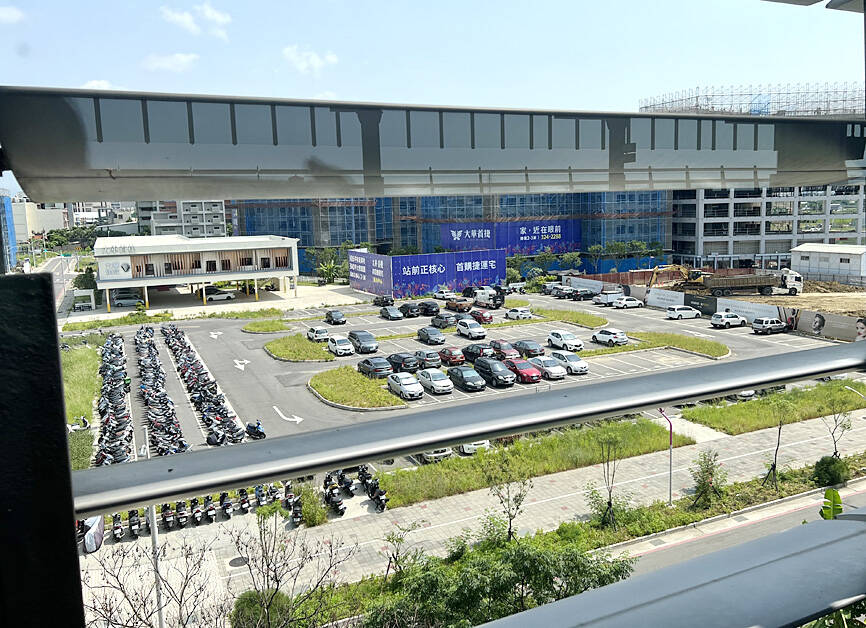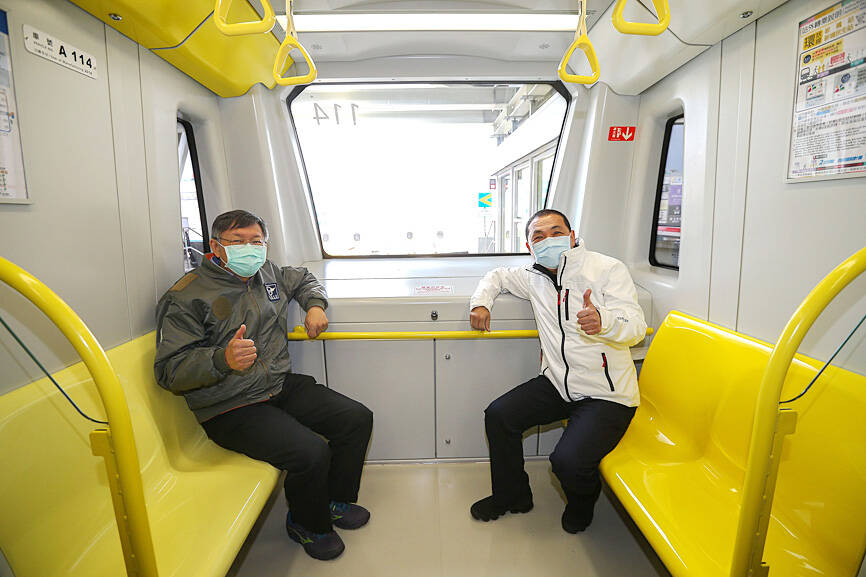The Executive Yuan has proposed spending NT$210.2 billion (US$6.96 billion) over the next two years of the fourth phase of the Forward-looking Infrastructure Development Program, primarily focusing on metropolitan public transportation systems.
The phase four project plans, which have yet to be submitted to lawmakers, would propose spending NT$104.4 billion next year and NT$105.8 billion in 2024, the Executive Yuan said.
They include 27 initiatives for trains, high-speed rail and MRT systems, which would be collectively allotted NT$53.8 billion; NT$4.4 billion for urban and rural development; NT$45.1 billion for water infrastructure; and NT$38.2 billion for digital infrastructure.

Photo provided by Taoyuan Department of Rapid Transit System
The projects also include NT$1.4 billion for childcare facilities in a bid to increase the birthrate, NT$1.4 billion for efforts to improve food safety standards and NT$10.2 billion for professional educational training, along with measures aimed at boosting employment.
The biggest spending item for the rail-related projects is a NT$6.9 billion plan to extend the Taoyuan Airport MRT and develop the areas along that transit line, the Executive Yuan said.
The plans include NT$5.5 billion to electrify the double-track railway running from Hualien to Taitung, and NT$5.26 billion to build a subway system in Tainan.

Photo: CNA
The proposals also include NT$6.2 billion to build underground rail in Taoyuan, and NT$5.89 billion to incorporate digital technology into the Taiwan Railways Administration (TRA) network.
These projects aim to integrate local trains and the high-speed rail into a seamless public transit system while upgrading TRA systems and improving the quality of its services in the country’s eastern region.
The Special Act on the Forward-looking Infrastructure Development Program (前瞻基礎建設特別條例) was passed by the Legislative Yuan in July 2017 to allow the Cabinet to spend up to NT$840 billion on national infrastructure over eight years.
Phase four projects are funded exclusively through public financing, DGBAS Minister Chu Tzer-ming (朱澤民) said on Friday, adding that NT$70 billion remains from the development program.
Separately, the Ministry of Digital Affairs said its budget for next year is NT$5.7 billion, while another NT$16 billion would be allotted from the infrastructure development program for the ministry to contribute to other government entities.
The funds from the forward-looking program are to cover efforts to upgrade government services, implement infrastructure projects, upgrade industry with digital technology, cultivate talent, close the urban-rural digital gap and help non-profit organizations take advantage of information technology, it said.
The Executive Yuan’s general budget proposal was also finalized on Thursday, in which the Ministry of Culture’s proposed budget for next year is NT$21.22 billion, an increase of 20 percent over this year’s NT$17.76 billion.
The boost to the culture ministry’s budget would be further augmented by the infrastructure program’s funding of NT$2.55 billion next year and NT$2.97 billion in 2024, the ministry said.
The money would be used to promote national languages and traditional arts, preserve cultural heritage, and fund the maintenance and construction of museums, the ministry said.
Its planned public works include improvements to the National Human Rights Museum and Sun Yat-sen Memorial Hall, and building a National Children’s Future Plaza, it added.
Additional reporting by Ling Mei-hsueh and CNA

A magnitude 7.0 earthquake struck off Yilan at 11:05pm yesterday, the Central Weather Administration (CWA) said. The epicenter was located at sea, about 32.3km east of Yilan County Hall, at a depth of 72.8km, CWA data showed There were no immediate reports of damage. The intensity of the quake, which gauges the actual effect of a seismic event, measured 4 in Yilan County area on Taiwan’s seven-tier intensity scale, the data showed. It measured 4 in other parts of eastern, northern and central Taiwan as well as Tainan, and 3 in Kaohsiung and Pingtung County, and 2 in Lienchiang and Penghu counties and 1

FOREIGN INTERFERENCE: Beijing would likely intensify public opinion warfare in next year’s local elections to prevent Lai from getting re-elected, the ‘Yomiuri Shimbun’ said Internal documents from a Chinese artificial intelligence (AI) company indicated that China has been using the technology to intervene in foreign elections, including propaganda targeting Taiwan’s local elections next year and presidential elections in 2028, a Japanese newspaper reported yesterday. The Institute of National Security of Vanderbilt University obtained nearly 400 pages of documents from GoLaxy, a company with ties to the Chinese government, and found evidence that it had apparently deployed sophisticated, AI-driven propaganda campaigns in Hong Kong and Taiwan to shape public opinion, the Yomiuri Shimbun reported. GoLaxy provides insights, situation analysis and public opinion-shaping technology by conducting network surveillance

‘POLITICAL GAME’: DPP lawmakers said the motion would not meet the legislative threshold needed, and accused the KMT and the TPP of trivializing the Constitution The Legislative Yuan yesterday approved a motion to initiate impeachment proceedings against President William Lai (賴清德), saying he had undermined Taiwan’s constitutional order and democracy. The motion was approved 61-50 by lawmakers from the main opposition Chinese Nationalist Party (KMT) and the smaller Taiwan People’s Party (TPP), who together hold a legislative majority. Under the motion, a roll call vote for impeachment would be held on May 19 next year, after various hearings are held and Lai is given the chance to defend himself. The move came after Lai on Monday last week did not promulgate an amendment passed by the legislature that

Taiwan is gearing up to celebrate the New Year at events across the country, headlined by the annual countdown and Taipei 101 fireworks display at midnight. Many of the events are to be livesteamed online. See below for lineups and links: Taipei Taipei’s New Year’s Party 2026 is to begin at 7pm and run until 1am, with the theme “Sailing to the Future.” South Korean girl group KARA is headlining the concert at Taipei City Hall Plaza, with additional performances by Amber An (安心亞), Nick Chou (周湯豪), hip-hop trio Nine One One (玖壹壹), Bii (畢書盡), girl group Genblue (幻藍小熊) and more. The festivities are to